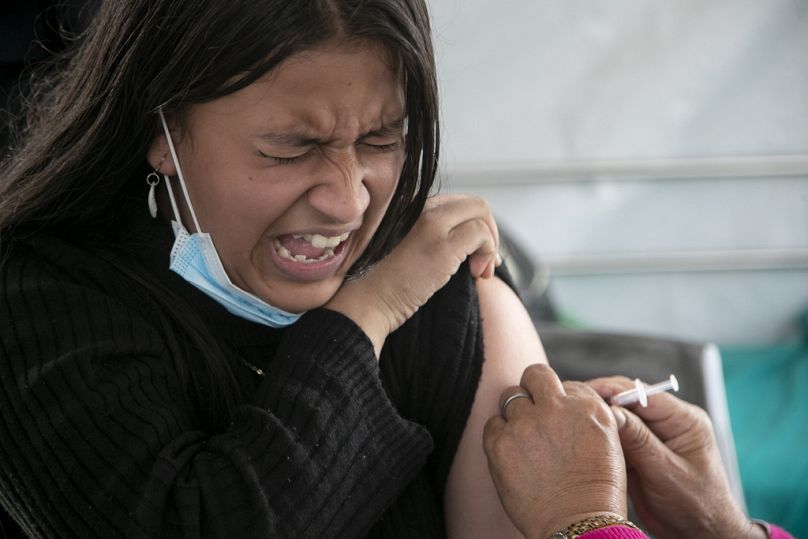The World Health Organization has lifted the COVID-19 international emergency, but is urging the world to stay alert
The World Health Organization (WHO) has announced that it no longer considers the spread of COVID-19 as a global emergency.
After 3 years of pandemic, the downgrade was announced because the WHO sees the steady decline in COVID-19 mortality as encouraging.
“The number of reported deaths from coronavirus has now decreased by 95% compared to the beginning of this year,” said WHO chief Tedros Adhanom Ghebreyesus.
But David Nabarro, WHO Special Envoy on COVID-19, said it was important for the world not to drop its guard.
"The WHO is asking all governments not to behave as though it's disappeared," he says. "But actually to give it the right level of attention by keeping the problem under surveillance, by making sure that people are vaccinated and by keeping a very, very eagle eye open for any more variants that might emerge."
So is this downgrade the right decision? And what will it change for countries and ordinary people?
Public health systems are recovering
According to the WHO, more than seven million people have died from COVID-19. The coronavirus has undermined the health of the global economy, locked people at home and even put many of them out of work.
But have health systems now gained enough experience during the coronavirus pandemic to be more effective in any future pandemic?
In one of the latest studies, WHO experts analysed the situation in 139 states. The experts concluded that health services are now experiencing significantly less disruption than in 2020 and are in a state of gradual recovery.
Of the 139 states, less than 25 per cent of countries reported interruptions to the provision of medical services. Whereas in July-September 2020, 59 per cent of countries reported problems of this kind.
These include reproductive health services, immunizations, care for the elderly, communicable and non-communicable diseases, maternal, newborn and adolescent care, screening and diagnostic services.
The world must be prepared for new pandemics
The WHO urged the world to prepare well for the start of the COVID-19 pandemic. Restoring essential health services is critical, as disruptions could have even greater adverse health effects on populations and individuals than the pandemic itself.
On February 12, 2018, WHO Director-General Tedros Adhanom Ghebreyesus, speaking at the Dubai Summit, stated: "A devastating epidemic can start in any country at any moment and claim millions of lives because we are not ready, because we remain vulnerable."
Ten months later, the sad prediction came true.
How concerned should we still be about COVID-19 in order not to repeat past mistakes? What factors should we be taking into account as we go about our day-to-day lives?
According to the organisation's report, most countries have made progress in integrating the fight against COVID-19 into the standard system of health care. Vaccination is still an effective tool. 80-90% of countries have fully integrated into their routine practice: COVID-19 vaccination, diagnosis and management services and COVID-19 survivor care services.
What plans are in place to deal with future pandemics?
Respiratory pathogens have been and will continue to be a major global threat with the potential to cause a pandemic. The consequences are well known: high mortality rates, overburdened health systems, destabilization of the global economy and widening inequalities in access to health services. Are countries still placing enough emphasis on the dangers connected with the virus? What plans are in place to deal with future pandemics?
To help countries better prepare for future pandemics, the WHO launched a new initiative in late April that provides guidance on how to plan comprehensively to respond to any respiratory pathogen, given the prevalence of many groups.
Called PRET, this initiative is designed to ensure readiness and resilience against new threats. It brings together the latest tools and approaches for collaborative learning and collective action developed during the COVID-19 pandemic and other public health emergencies.
WHO invites countries to:
- Update pandemic preparedness plans
- Improve communication between relevant departments.
- This includes conducting joint exercises, sharing best practices, challenges and opportunities.
- Based on experience gained during the coronavirus pandemic, allocate funds for activities to prepare for new public health emergencies.
Science does not stand still
2,000 scientists and 600 hospitals from 52 countries are participating in the so-called Solidarity study. This is an unprecedented international collaboration to find life-saving cures for COVID-19.
Scientists are evaluating three drugs that could complement the arsenal of drugs used in accordance with the national protocol. The study involved 14,200 hospital patients.
According to preliminary results, remdesivir, hydroxychloroquine, lopinavir and interferon are of little effect in patients hospitalized with COVID-19.
PRET is an evolution of WHO's approach to pandemic preparedness based on an objective approach rather than specific diseases. WHO will continue to develop and disseminate disease-specific guidelines as needed.












